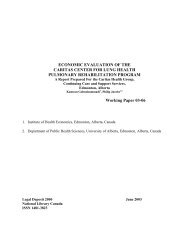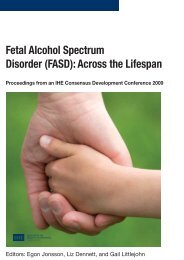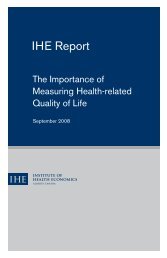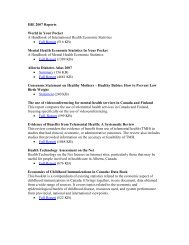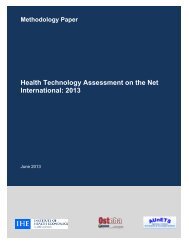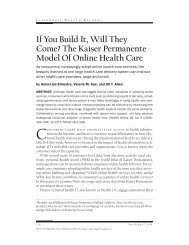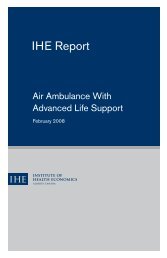Bariatric treatments for adult obesity - Institute of Health Economics
Bariatric treatments for adult obesity - Institute of Health Economics
Bariatric treatments for adult obesity - Institute of Health Economics
- No tags were found...
You also want an ePaper? Increase the reach of your titles
YUMPU automatically turns print PDFs into web optimized ePapers that Google loves.
workers and other pr<strong>of</strong>essionals, continue to educate, counsel, and assess the patient during multipleclinic sessions be<strong>for</strong>e surgery. The number <strong>of</strong> preoperative sessions varies among programs and is afunction <strong>of</strong> the staff resources available to the programs.Some individuals with <strong>obesity</strong> may not be considered suitable candidates <strong>for</strong> surgery during this time,and other treatment options may be determined to be more appropriate and successful in the longterm. Adults who qualify <strong>for</strong> bariatric surgery are required to demonstrate a change in lifestyle andbehaviour be<strong>for</strong>e the surgery. Compliance assessment is generally based on weight stabilization, fullcommitment to attending all pre-operative clinic sessions and follow-up appointments, and fullcommitment to self-monitoring (by practicing lifestyle journaling). The support <strong>of</strong> thesemultidisciplinary teams is <strong>of</strong>fered to the patient throughout pre-operative periods, as well as duringand immediately after the surgery, and may continue long-term to help the patient maintain weightloss.Additional weight management programs exist that provide only nonsurgical bariatric care <strong>for</strong> <strong>adult</strong><strong>obesity</strong> in Alberta. As well, a number <strong>of</strong> private clinics and programs, including the Calgary WeightManagement Program (www.cwmc.ca), the Lefebre Clinic in Calgary(www.calgaryweightlossclinic.com), and the 12 locations <strong>of</strong> the Dr. Bernstein clinics(http://ab.drbdiet.com), <strong>of</strong>fer medically supervised weight loss in Alberta. The non-surgical weightmanagement programs vary according to their weight loss philosophies, the components <strong>of</strong> theprograms, and the costs that individuals pay while accessing these services.Additionally, the database <strong>of</strong> the College <strong>of</strong> Physicians and Surgeons <strong>of</strong> Alberta lists over 60 generalpractitioners or family doctors that declare <strong>obesity</strong>, bariatric care, or weight management as one <strong>of</strong>their primary interests. There are also 15 specialists (not including bariatric surgeons) who consider<strong>obesity</strong> to be one <strong>of</strong> their primary interests.LimitationsThe present review has several limitations. The literature review was limited to reports <strong>of</strong> articles anddocuments that were written in English and published between January 2005 and June 2010.Proprietary reports were excluded. Only full-text articles were selected because abstracts provideinsufficient details to allow an accurate, unbiased assessment and comparison <strong>of</strong> the study results.The authors <strong>of</strong> the abstract-only publications were not contacted <strong>for</strong> full details <strong>of</strong> their studies.The present review only summarizes the recommendations from reports <strong>of</strong> relevant, evidence-basedclinical practice guidelines and care pathways, and does not appraise their scientific foundations.A literature search focused on program evaluation studies was not conducted.Clear answers could not be provided <strong>for</strong> some questions due to the absence <strong>of</strong> relevant data <strong>for</strong>Alberta.SummaryThe social systems and demographics review summarizes the available evidence from the scientificliterature published in Canada and worldwide (mainly in North America) and the in<strong>for</strong>mationobtained from Canadian databases to address the questions about the burden <strong>of</strong> <strong>adult</strong> <strong>obesity</strong>, thepopulation dynamics <strong>of</strong> affected individuals, the current patterns <strong>of</strong> care and issues related to theimplementation and provision <strong>of</strong> bariatric <strong>treatments</strong> within weight management/bariatric programs.The following sections highlight the key findings.<strong>Bariatric</strong> <strong>treatments</strong> <strong>for</strong> <strong>adult</strong> <strong>obesity</strong> 37



